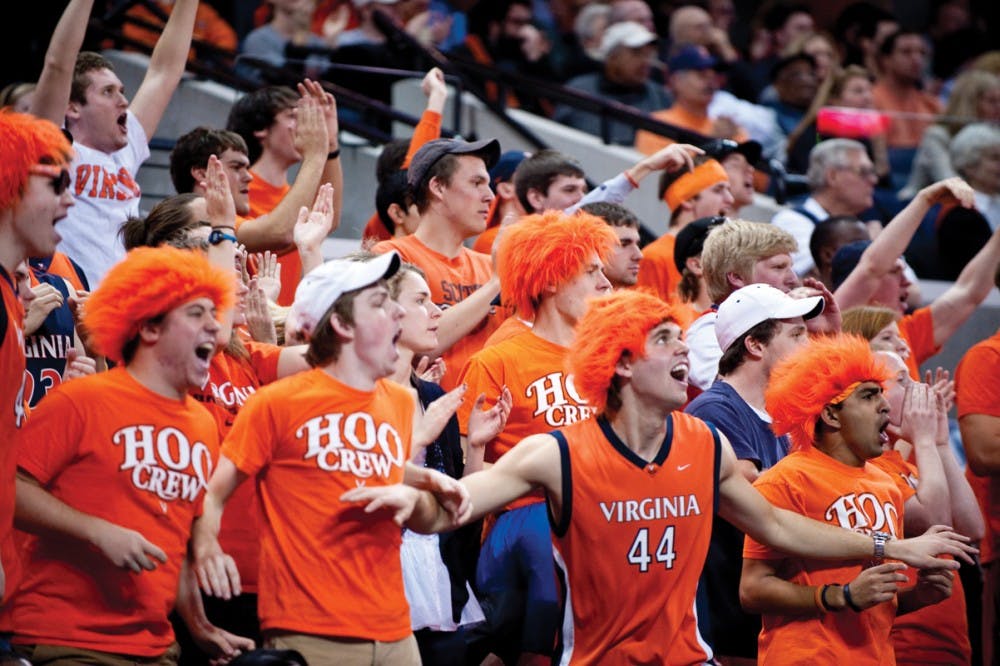At times last year, Mike Scott became synonymous with the 2011-12 Virginia men’s basketball team. After missing the bulk of the previous season with injury, Scott transformed Virginia from a 16-15 ACC also-ran into a 22-10 March Madness participant.
With his return, Scott provided more than just the depth Virginia desperately lacked in the post. The 6-foot-9-inch forward also emerged as one of the conference’s deadliest mid-range shooters by sporting a seemingly automatic fadeaway jumper. He averaged 18 points and 8.3 rebounds per game en route to snagging first-team All-ACC honors and a spot on the Atlanta Hawks.
Scott largely defined last year’s Virginia team. The Cavaliers hope his absence won’t define this season as well.
“We don’t go into the season thinking, ‘Oh man, we got to replace Mike,’” junior forward Akil Mitchell said. “We go into the season looking at who we have and what we can do. I feel like I can produce numbers just as well, and some of the other guys can get more opportunities to step up.”
Rather than simply “replacing” Scott, coach Tony Bennett recognizes his team must alter last year’s formula. Virginia’s offense can no longer rely on a single star to power them past ACC competition.
“We’ll have to do more of a balanced attack this year,” Bennett said. “Hopefully four or five guys are in that 8-12 [points per game] range as opposed to … last year. A lot of the offense was geared toward getting the ball to Mike in certain spots and letting him go to work. I think we’ll look a little different this year.”
The more balanced attack begins with Virginia’s veteran trio of Mitchell, junior swingman Joe Harris and senior guard Jontel Evans.
Evans anchored Virginia’s defense last year and paced the team with 50 steals and 124 assists. The All-ACC Defensive Team selection, however, underwent surgery Oct. 2 on his right foot and will likely miss the season’s first few weeks while recovering.
“Without Jontel, we don’t have a guy who can really get his own every time he wants and create for others,” sophomore guard Paul Jesperson said. “So now I think it’s going to be a lot more moving without the ball, coming off of screens, setting good screens and then just making plays off of that.”
With Evans sidelined, Virginia will play only two upperclassmen. Mitchell and Harris once belonged to a recruiting class six-deep, but then-sophomore guard KT Harrell transferred Dec. 23 of last year. Forward James Johnson left the next day.
“I thought at this stage we would have more of a mature team,” Bennett said. “I thought we’d have a number of upperclassmen but with the departures and the transfers, that makes you have to take a step back and work with the younger guys, and I think some of these younger guys are probably going to have a really nice future.”
Although the transfers robbed Virginia of veterans, they also handed last season’s marginal players more playing time. When then-senior center Assane Sene injured his ankle Jan. 19, Bennett could no longer turn to the 6-foot-9-inch Johnson for size, and Mitchell assumed the bulk of playing time. Likewise, then-freshman forward Darion Atkins began receiving regular minutes after previously playing sparingly.
Without both Scott and Sene, Mitchell and Atkins take on increased importance this season. Bennett’s 6-foot-11-inch recruit, freshman Mike Tobey, may ultimately fill out the starting lineup, but Mitchell and Atkins provide necessary experience in the paint. Although Mitchell averaged a pedestrian 4.1 points and 4.4 boards last year, he posted an apparent breakout performance in the ACC tournament with 10 points and 12 rebounds against N.C. State. Bennett hopes Mitchell can replicate that elevated level of play throughout an entire season.
“At the end of the year he started playing some good basketball for us,” Bennett said. “He was productive [at] offensive rebounding, finishing plays, and he has worked hard to develop some more work on his shots and more moves … just the little increments of his improvement will make a difference.”
More important than any one player, though, the Cavaliers have a weapon that will never graduate — their defense. Despite a new-look lineup, Bennett maintains that his famous pack-line defense will stay the same.
“Our defense is our staple,” he said. “We run our half-court man-to-man defense. That has been probably the best thing that we’ve had going, and it’s gotten better over the years. So I’m not a coach that is going to half the time full-court press or even half-court trap … At this level, you better be really good at a few things to be competitive.”
The Cavaliers admit they have fundamental flaws, but Bennett has a propensity for making his squad’s sum greater than its parts. The team believes this year will be no exception.
“I understand that we have a really young team and maybe next year will really be our year to really do some damage,” Harris said. “But I’m not going to sell ourselves short of anything either, and we’ve taken it upon ourselves as a group to not take any steps back from last year. We kind of want to make improvements each year that we’re involved with this program.”







